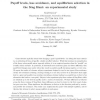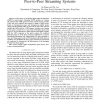399 search results - page 11 / 80 » Games with Congestion-Averse Utilities |
DAGSTUHL
2006
13 years 11 months ago
2006
Game theorists typically assume that changing a game's payoff levels--by adding the same constant to, or subtracting it from, all payoffs--should not affect behavior. While t...
INFOCOM
2011
IEEE
13 years 1 months ago
2011
IEEE
—In this paper we model the digital rights management (DRM) for peer-to-peer streaming (P2PS) systems as a game. We construct the DRM game from both content service provider (CSP...
CSE
2009
IEEE
14 years 1 months ago
2009
IEEE
ACT We present ongoing research on large-scale decision models in which there are many invested individuals. We apply our unique Bayesian belief aggregation approach to decision pr...
CORR
2011
Springer
13 years 4 months ago
2011
Springer
We determine the robust Nash equilibrium (RNE) for a wide range of problems in communications systems and networks that are faced with uncertainty in their parameters’ values. T...
CIG
2005
IEEE
14 years 3 months ago
2005
IEEE
AbstractGroup utility functions are an extension of the common team utility function for providing multiple agents with a common reinforcement learning signal for learning cooperat...


